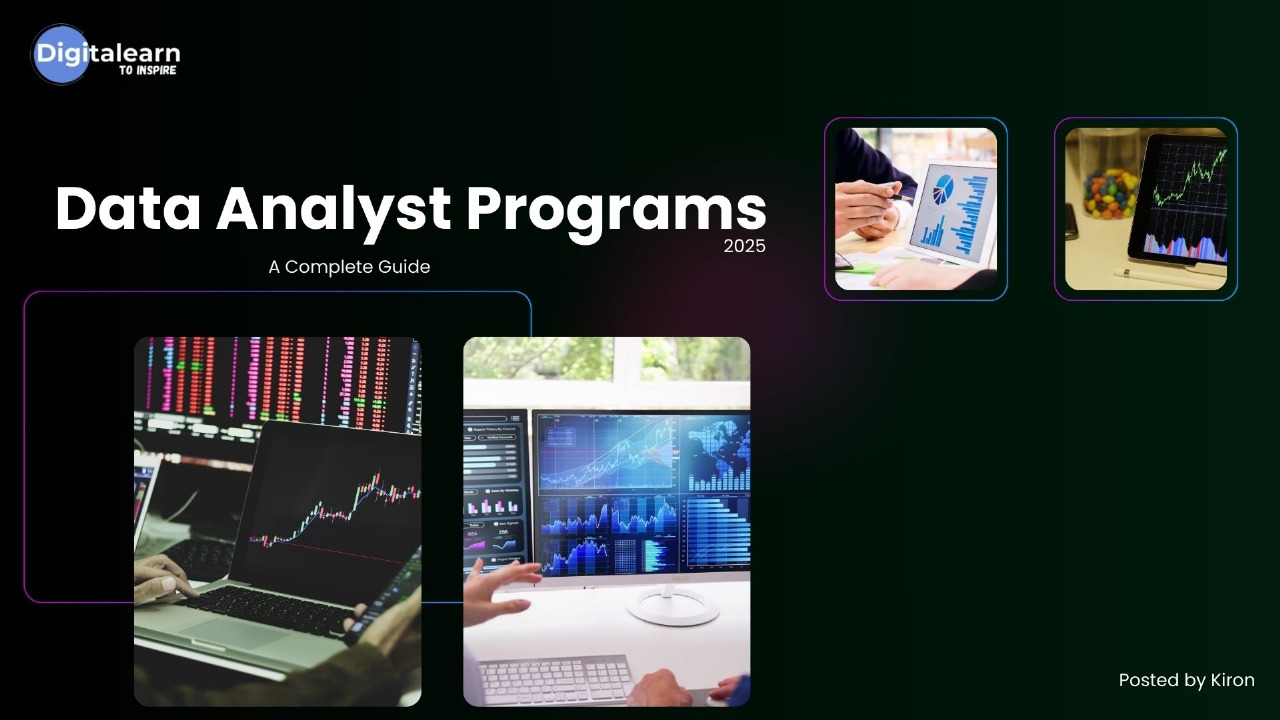
Best Data Analyst Programs in 2025: A Complete Guide
In today’s data-driven world, businesses rely on skilled professionals to turn raw data into valuable insights. That’s where Data Analyst Programs come in. Whether you’re a beginner looking to break into the field or a professional aiming to upskill, enrolling in the right program can open doors to high-paying opportunities. These structured courses teach essential skills like SQL, Python, data visualization, and statistical analysis—preparing you for real-world challenges. In this guide, we’ll explore the best Data Analyst Programs for 2025, helping you choose the right path to launch or accelerate your data analytics career.
What is a Data Analyst Program?
A data analyst program is a structured educational course that teaches the skills needed to work as a data analyst. These programs cover topics like data visualization, statistical analysis, and programming languages such as Python and SQL.
Unlike a short-term certification, a data analyst program provides a comprehensive learning experience, including hands-on projects, theoretical knowledge, and career support. A well-designed program can help students gain real-world expertise and prepare them for jobs in industries that rely on data-driven decision-making.
A data analyst program is essential for career growth because the demand for data professionals is increasing. Companies need skilled analysts to interpret data and provide insights that guide business decisions. Completing a data analyst program can improve job prospects, boost salary potential, and provide opportunities for career advancement.
Why Should You Enroll in a Data Analyst Program?
Data analysts are in high demand, with businesses across all sectors depending on data insights. The growing reliance on big data, artificial intelligence, and machine learning has increased the need for professionals who can analyze data effectively. A structured data analyst program equips students with industry-relevant skills, making them job-ready.
After completing a data analyst program, candidates can expect competitive salaries. The average salary for an entry-level data analyst is between $60,000 and $80,000 annually, while experienced professionals can earn over $100,000. Certification and formal training increase job opportunities and salary potential.
Types of Data Analyst Programs Available
There are different types of data analyst programs, depending on learning style and career goals. Some programs are part of university degrees, while others offer certification or bootcamp-style training. Here are the primary options:
- University Degrees: Traditional degree programs that provide a deep understanding of data analysis, statistics, and business intelligence.
- Online Certifications: Short-term courses focusing on specific skills, often self-paced and flexible.
- Bootcamps: Intensive, short-term training programs designed to prepare students for jobs quickly.
Students can also choose between full-time, part-time, and self-paced learning. Some prefer in-person courses for direct interaction with instructors, while others opt for online courses for flexibility.
Best Data Analyst Programs for 2025
If you’re looking to enroll in a data analyst program, platforms like Digitalearn Solution provide industry-recognized training designed to equip learners with in-demand skills. Their comprehensive courses cover key topics such as data visualization, SQL, Python, Excel, statistical analysis, and machine learning fundamentals.
With a strong focus on hands-on learning, students engage in real-world projects, case studies, and interactive exercises to build practical expertise. Additionally, the program offers mentorship from industry experts, resume-building assistance, and job placement support to help graduates transition smoothly into the workforce.
Whether you’re a beginner exploring data analytics for the first time or a career changer seeking new opportunities, Digital Earn Solution provides a structured learning path to help you succeed in the growing field of data analytics.
Connect with Digitalearn Solution on social media:
How to Choose the Right Data Analyst Program for You
Selecting the best program depends on several factors:
- Cost: Some programs are expensive, while others offer free learning resources.
- Duration: Full-time courses are faster, but part-time options provide flexibility.
- Accreditation: Recognized programs improve job prospects.
- Job Placement Rate: Programs with high placement rates offer better career opportunities.
- Learning Style: Choose between hands-on projects and theory-focused courses.

What Skills Do You Need to Become a Data Analyst?
Technical Skills
A data analyst needs strong technical skills to analyze data effectively:
- SQL and Databases – Essential for managing and querying data.
- Python and R Programming – Used for statistical analysis and automation.
- Data Visualization – Tools like Tableau and Power BI help in presenting insights.
- Excel and Spreadsheets – Basic but essential for data manipulation.
- Statistical Analysis – Helps in interpreting data trends and making predictions.
Soft Skills
Soft skills are equally important for a successful data analytics career:
- Problem-Solving and Critical Thinking – Helps in analyzing data effectively.
- Communication and Storytelling with Data – Enables presenting findings clearly.
- Business Acumen – Understanding business needs improves decision-making.
Is a Data Analyst Certification Worth It?
Getting certified has its pros and cons. On the positive side, certification improves job opportunities and salary potential. Many employers prefer certified candidates, as it demonstrates verified skills. However, some certifications require a financial investment, and real-world experience is still necessary. Ultimately, a certification combined with hands-on learning offers the best career prospects.
How to Get Started with a Data Analyst Program
Before enrolling in a program, consider these steps:
- Check Prerequisites: Some courses require prior knowledge of math or programming.
- Build a Strong Application: Research and apply to top programs.
- Explore Free and Paid Courses: Many platforms offer free introductory courses.
Alternative Paths to Becoming a Data Analyst
A formal program is not the only way to enter the field. Alternative paths include:
- Self-Learning: Free resources like YouTube tutorials and open-source projects.
- Internships and Apprenticeships: Gain hands-on experience through practical work.
- Job Experience Without Certification: Many analysts enter the field through on-the-job training.
Conclusion
A data analyst program is an excellent investment for anyone looking to start or advance their career in data analytics. With various options available, including university programs, online certifications, and bootcamps, learners can choose what best fits their needs. By developing technical and soft skills, aspiring analysts can position themselves for high-paying and rewarding careers in 2025 and beyond.







